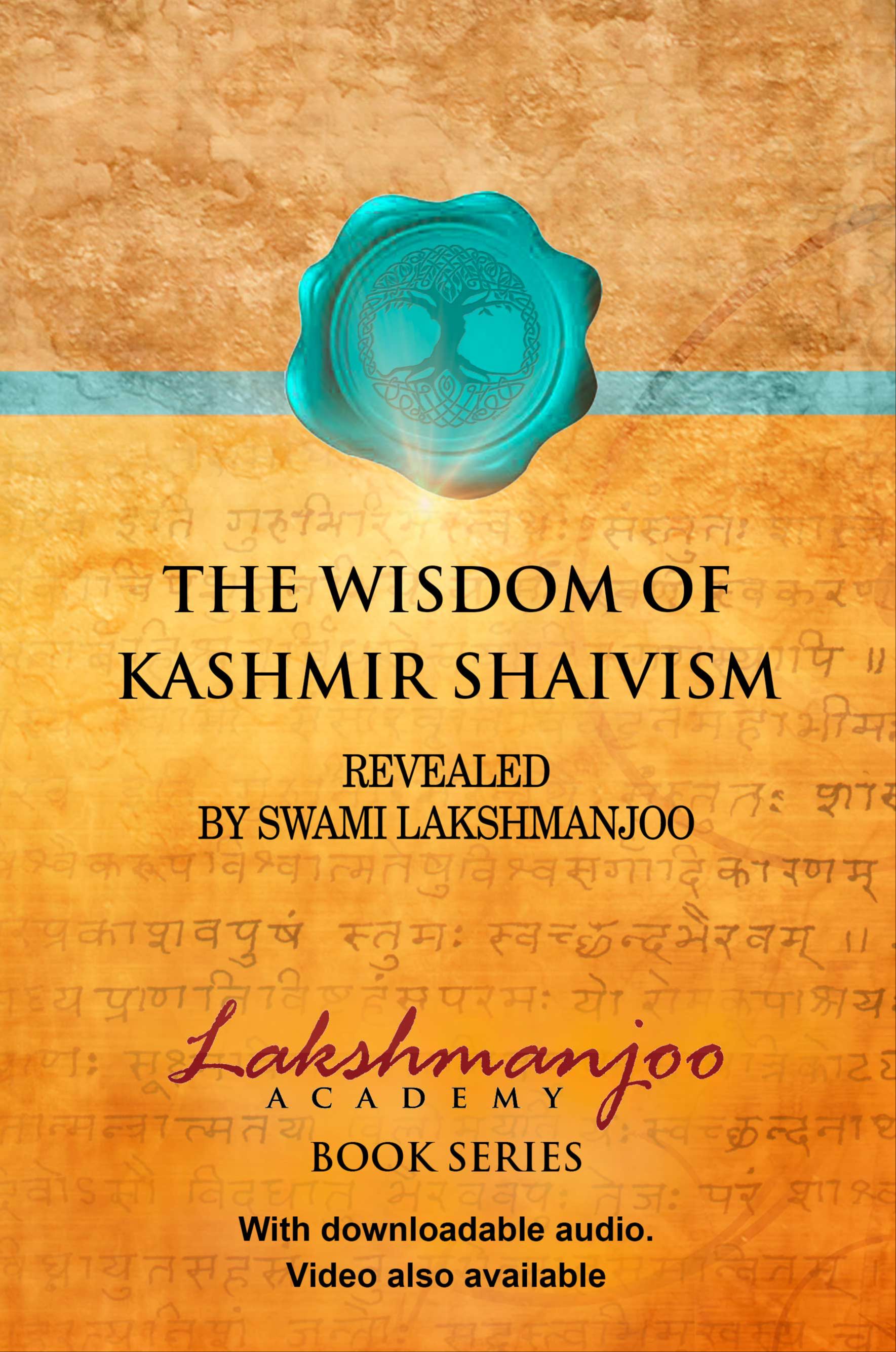
Revealing this first verse of the Śiva Sūtra Vimarśinī, Swami Lakshmanjoo explains how
“the supreme consciousness is the reality of everything“.

Prathamaḥ unmeṣa
First Awakening
Now Śiva sūtras will be explained here.
tatra prathamaṁ nareśvarabhedavādi pratipākṣyeṇa caitanyaparamārthataḥ śiva eva viśvasya ātmā iti ādiśati-
First, at first he exposes here that the reality of the universe is Self, it is not false. The reality of the universe is the real Self. And it is contrary to the sayings and theory of those who explain and define that, nareśvara bhedavādi: the individual is always individual, and universal Being is always universal Being and universal Being will never be united with individual being.
On the contrary he says, “Individual Being is one with Universal Being. So, the reality of this whole universe is God consciousness, it is filled with God consciousness.”

And the sūtra is:
caitanyamātmā // 1 //
The supreme consciousness is the reality of everything–caitanyam ātmā.
Ātmā means the reality of everything. Supreme consciousness is the reality of everything.
Because, iha, commentary now . . .
iha acetitasya kasyāpi sattvābhāvāt, citikriyā sarvasāmānyā-rūpā cetayati iti cetanaḥ sarvajñānakriyāsvatantraḥ, (not recited in full)
The one who is not, who has not come in consciousness, is not existing at all–acetitasya kasyāpi sattvābhāvāt. Citi kriyā sarva sāmānyārūpā, so, the act of consciousness is the same in the conscious and unconscious. The one who is conscious, the act of consciousness is there; the one who is not conscious of that, the act of consciousness is there in the background. Cetayati iti cetanaḥ, so, the conscious being is that who makes others conscious, and sarva jñāna kriyā svatantraḥ, who is independent in each and every knowledge and each and every action.
tasya bhāvaḥ caitanyaṁ sarvajñānakriyāsaṁbandhama
tacca paramaśivasaiva-bhagavataḥ asti; (not recited)
This state is called caitanya, complete independence; sarva jñāna kriyā saṁbandhamayam, who is the uniting agency, uniting agency of all knowledge’s and of all actions. All knowledge’s and all actions are united in one consciousness and that is complete independence of God consciousness. And that complete independence of God consciousness is possessed by Paramaśiva1 only.
anāśritāntānāṁ tatparatantravṛittitvāt / sa ca yadyapi nityatvavyāpakatvamūrtatvād
Up to anāśrita, from earth to Anāśritaśiva2 all beings are dependent to that conscious Being of Śiva. Although that complete independent state of Śiva is possessed by many aspects–of being eternal, of being all-pervading, of being all-full, pūrṇatā, or being all-knowing3–but all these other aspects of Lord Śiva are found, and could be found, in other beings also. So the one and the only aspect of Lord Śiva is complete independence, svātantrya.
Anyāsaṁbhavinaḥ, and that complete independence is found nowhere except in Lord Śiva, in the state of Lord Śiva. So, the complete independence, the state of complete independence, is shown here with full effort. So . . .
ithaṁ dharmāntarapratikṣepataśca, caitanyamiti bhāvapratyayena darśitam /
. . . so [he uses] caitanyam, the word caitanyam, not the word cetanā. If he would explain that there are other aspects also existing in the state of Lord Śiva, other aspects than his aspect of complete independence, svātantrya (there are other aspects: all-pervading-ness, all-fullness, all-ānanda and so on), but as there is only one aspect and that is svātantrya, so that svātantrya is being exposed by the word caitanya. So cetanā is not put in sūtras. Instead of cetanā, he has put in sūtras, caitanya–bhāva pratyaya. This shows caitanya means the independent way of consciousness, independent state of consciousness. And that is the Self. That is the Self of everything whatever exists in this world. Because whatever exists in this world is the state of Lord Śiva. So Lord Śiva is found everywhere.

na punaranyaḥ ko ‘pi bhedavādyabhyupagato bhinnabhinnasvabhāvaḥ /
And that, bhinnabhinna svabhāvaḥ, the different aspects of Lord Śiva do not exist at all.
[Kṣemarāja raises points on the various aspects of Lord Śiva.]
If those different aspects also would exist . . .
tasya acaitanye jaḍatayā anātmatvāt / cidātmatve bhedānupapatteḥ, cito deśakālākāraiḥ cidvyatirekāt acetyamānatvena asadbhiḥ, cetyamānatvena tu cidātmabhiḥ, bhedasya ādhātuṁ aśakyatvāt,
. . . that differentiated aspects of Lord Śiva, if for the time being we would accept, [then] how could those different aspects exist?
He explains the way to exclude them from being the aspects of Lord Śiva.
If those aspects are not filled with svātantrya then they are jaḍa, then they are ‘unconscious’, just like anātmā [non-self].
If those aspects too are also filled with the independent consciousness [svatantrya] of Lord Śiva, then why not accept independent consciousness, why to accept those aspects at all?
And at the same time, if this state of God consciousness is existing in its fullness of independence, [and] deśa-kāla-akāraiḥ cid vyatirekāt, time, space, and forms, also, if they are separate from that independent state of consciousness, [then] they are not existing; nor is time existing, nor is space existing, nor is form existing.
Cetyamānātvena tu cidātmabhiḥ, if we accept those aspects also, that he is nitya [eternal], he is akālakalita [timeless], he is viśvakāra [the universal creator]; cetyamāntvena tu cidātmabhiḥ, if they are accepted as independent then they are filled with consciousness. If there is not independence in those, then they are away, then they have been carried away from that God consciousness, so they are not existing at all in the state of Lord Śiva.
––––––––––––––––––––
1 Paramaśīva here means supreme Śiva. [Editor’s note]
2 Anāśrita Śiva is where Śiva excludes universality from his nature because of the apprehension that universality might make him limited. [Editor’s note]
3 Through the energy of his own svātantrya śakti Lord Śiva possesses the five great energies: vyāpakatā (all-pervadingness), nityatā (eternality), pūrṇatā (fullness), sarvajñāta (omniscience, all-knowing-ness}, and sarvakartṛita (omnipotent, all-doing-ness). [Editor’s note]
Source: Shiva Sutras: The Supreme Awakening, by Swami Lakshmanjoo
All Content is subject to Copyright © John Hughes






